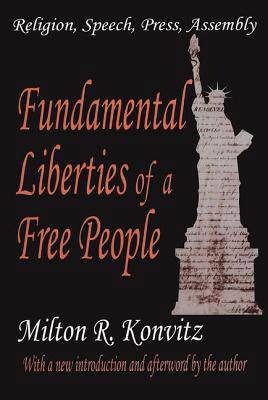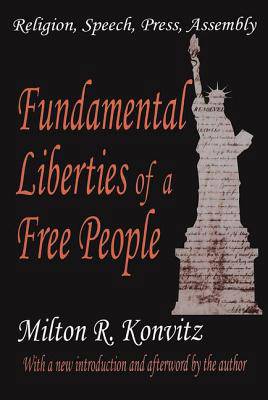
- Retrait gratuit dans votre magasin Club
- 7.000.000 titres dans notre catalogue
- Payer en toute sécurité
- Toujours un magasin près de chez vous
- Retrait gratuit dans votre magasin Club
- 7.000.0000 titres dans notre catalogue
- Payer en toute sécurité
- Toujours un magasin près de chez vous
Fundamental Liberties of a Free People
Religion, Speech, Press, Assembly
Milton Konvitz
Livre broché | Anglais
62,45 €
+ 124 points
Format
Description
Of the American Bill of Rights, perhaps the forty-five words that comprise the First Amendment-allowing freedom of religion, speech, press, and assembly, and the guaranty of the writ of habeas corpus-are the most precious. Only a legal expert could lay claim to truly understanding the meaning and intention of those basic freedoms. Yet it is precisely the expert, knowing the complexity of the subject, who would be the first to hesitate to claim to possess such a thorough understanding. In analyzing such freedoms basic to American society, Milton Konvitz helps make comprehending our fundamental liberties easier. The book is divided into three parts: I. Freedom of Religion; II. Freedom of Speech, Press, and Assembly; III. Freedom of Speech, Press, and Assembly: The Clear and Present Danger Doctrine. The reader will find included such topics as the debate over the scope of the separation of Church and State, whether or not freedom of religion is an absolute right, religious freedom prior to 1776, the liberty of private schools, heresy, the right for a religious group to seek converts, the freedoms not to speak and listen, obscene literature, picketing in labor disputes, the freedom to think and believe, abridgments of speech and press, and loyalty oaths and guilt by association. Konvitz's work includes an important chapter on the history of the adoption of the Bill of Rights. His careful tracing of the development of constitutional attitudes to the freedoms protected by the First Amendment is a scholarly benchmark, and is still an archetype for students doing research and writing about these issues. It is of critical importance to anyone seeking an authoritative statement on the basic liberties guaranteed by the First Amendment to the United States Constitution.Fundamental Liberties of a Free People is a relevant and practical guide to understanding the liberties so fundamental to a free society. In his new introduction and afterword, author Milton Konvitz brings First Amendment developments up to 2002. It will be welcomed by students and scholars of constitutional law, government, politics, religion, and American history.
Spécifications
Parties prenantes
- Auteur(s) :
- Editeur:
Contenu
- Nombre de pages :
- 478
- Langue:
- Anglais
Caractéristiques
- EAN:
- 9780765809544
- Date de parution :
- 30-11-02
- Format:
- Livre broché
- Format numérique:
- Trade paperback (VS)
- Dimensions :
- 151 mm x 227 mm
- Poids :
- 625 g

Les avis
Nous publions uniquement les avis qui respectent les conditions requises. Consultez nos conditions pour les avis.






